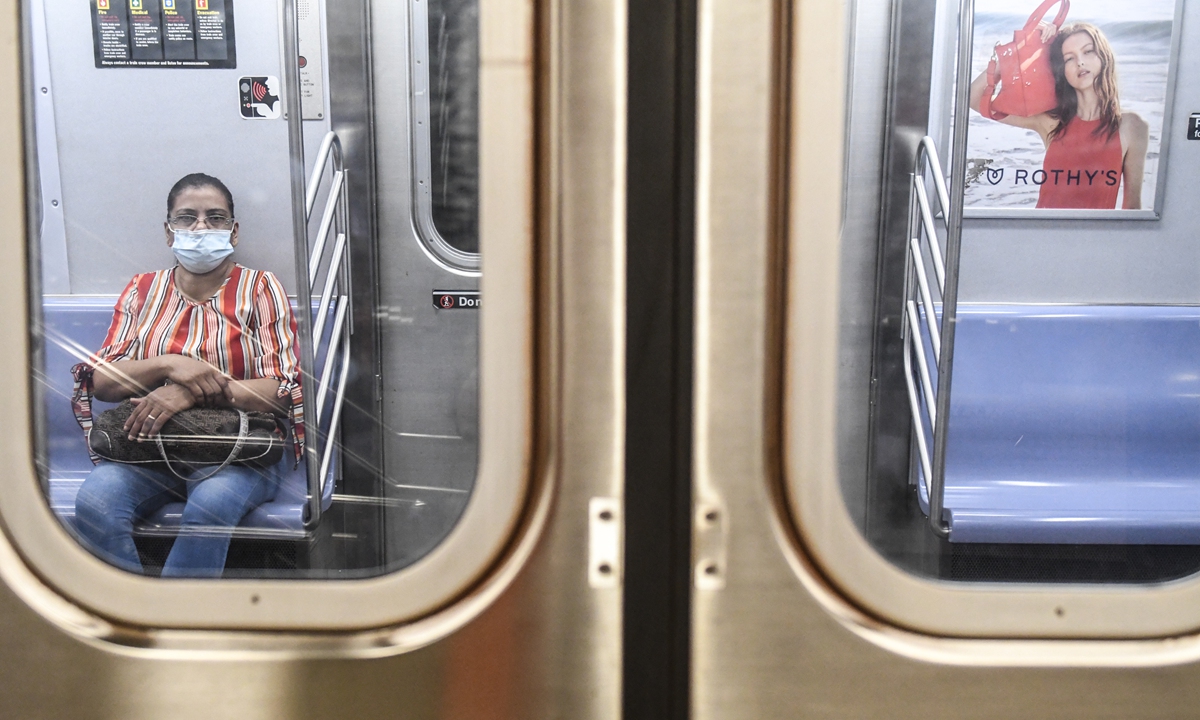US faces renewed uncertainty as resurgence of coronavirus hampers recovery for companies, individuals
By Xie Jun and Qi Xijia Source: Global Times Published: 2020/7/13 21:18:40
Resurgence of coronavirus hampers recovery for companies, individuals

A woman wears a mask on the subway in New York City's Brooklyn borough in June. Photo: AFP
A coronavirus resurgence in the US, which is sending infections to dire new levels in some regions, will add uncertainty to the US economy, experts told the Global Times.
But their opinions diverge on the impact. Some see dire outcomes like a second stock market collapse and slumping consumption, while some predict that the US economy can withstand the pressure with help from aggressive government fiscal support.
The US reported a one-day total of more than 60,000 new confirmed COVID-19 cases for four consecutive days as of Sunday. In total, 3,304,942 people had tested positive for COVID-19 in the US as of press time, according to data compiled by Johns Hopkins University.
Facing the virus resurgence, a growing number of US cities are pausing plans to reopen, such as Los Angeles, and eight states, including Texas and California, are again re-imposing restrictions. So far, 17 US states have totally reopened.
A US citizen in Ohio told the Global Times on Monday on condition of anonymity that in Ohio, almost all economic sectors have reopened, but none of them - like restaurants or retail stores - have recovered to pre-coronavirus levels.
For example, restaurants are limited to either 75 or 50 percent capacity. "There are some customers but not enough ... I doubt many restaurants and bars are seeing any kind of return to normalcy," he said, adding that some of his friends have taken pay cuts.
According to him, the US economy appeared to be in good shape before the pandemic but it was not working for the majority of Americans. "The middle class was shrinking ... the pandemic made the economic problems more visible to all Americans," he said.
Now, the situation is likely to take a toll on US companies' business performance. According to global financial market data provider Refinitiv, second-quarter earnings for S&P 500 companies would probably fall 44 percent year-on-year.
Zhou Rong, a senior research fellow at the Chongyang Institute for Financial Studies at the Renmin University of China, said the pandemic relapse is making the US economic outlook very unstable.
"Economic closures might cause the US employment rate, which showed promising signs of a rebound recently, to fall again. Repeated economic openings and shutdowns will also make people lack confidence about the economic future," he told the Global Times on Monday.
Zhou Maohua, a macroeconomist at China Everbright Bank, said that because of the extended pandemic, some small enterprises and jobs in the US will vanish, which will hit consumer confidence and any rebound in demand.
"If company profits deteriorate and the economic decline lasts for a long time, the US financial system will be unstable, and US stocks might collapse again or encounter a serious crisis," Zhou told the Global Times on Monday.
But some experts said the US economy will continue to rebound, supported by the Trump administration's fiscal stimulus in the form of an unprecedented relief package.
Tian Yun, vice director of the Beijing Economic Operation Association, said that considering Trump's policy direction, which is to revive US economy at all costs, it's very likely that the US government will soon roll out another stimulus package with similar strength as the one in March.
As long as fiscal stimulus continues, the US economy could achieve zero growth in the second quarter and expand again in the third, he said.
"The Trump administration is putting all emphasis on an economic revival to win the presidential election. As for the side effects, like excess liquidity, the government will leave it to be solved later, perhaps via future cooperation with China," Tian said.
Newspaper headline: US faces renewed uncertainty
Posted in: INDUSTRIES